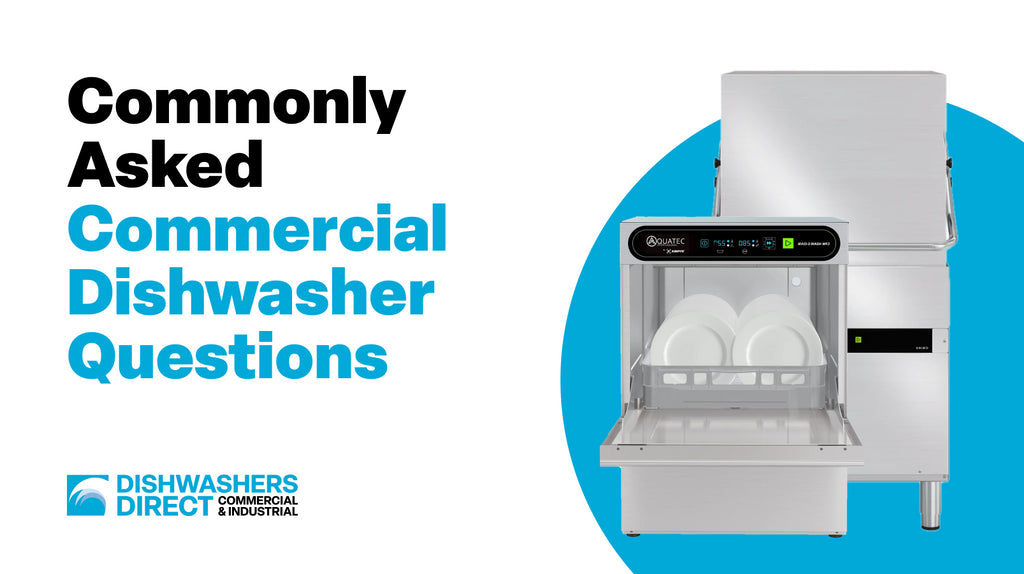Commonly Asked Commercial Dishwasher Questions
Posted by SAMUEL DEAKIN

In this guide we’ve collated the most frequently asked questions about commercial dishwashers. We cover why they happen and how to address these issues.
1. Why Is My Commercial Dishwasher Leaving Streaks on Glassware?
If your commercial dishwasher is leaving streaks on glassware, it’s most likely due to hard water. The minerals in the water that cause water to be ‘hard’ (calcium and magnesium), are left behind on the glass as it dries causing the visible streaks.
Causes:
• Hard water in the wash and rinse tank can leave a cloudy halo on your glassware.
• Hard water salts and deposits not washed or rinsed away will leave spots and streaks on the glass after they dry.
• Blocked jets or filters will mean deposits are not washed or rinsed away.
• A wash temperature that exceeds 55°C or a rinse temperature exceeding 65°C will cause deposits to bake onto the glass.
Solutions and Fixes:
• Fit a water softener to incoming water supply.
• Carry out daily maintenance checks and clean all filters and rinse jets.
• Check wash and rinse tank temperatures.
• Check detergent and rinse aid bottles are connected properly.
• Enlist an engineer to service your glass washer and check the temperature and chemical dosing settings.
2. Why Isn’t My Dishwasher Draining Properly?
If your commercial dishwasher isn’t draining properly, there are a few potential causes. It will usually be due to a blockage somewhere in the system.
Causes:
• Blocked filters.
• Clogged drains.
• Obstructed drain pumps.
• Faulty drain pump.
• Damaged drain hose.
• Clogged air gap.
Solutions and Fixes:
• Check the filters and drains for any buildup of food particles or other debris.
• Inspect the drain hose for kinks, damage, or loose connections.
• Clear the drain line using a drain snake or plunger.
• If the issue persists, check the pump and consider enlisting a professional.
3. Why Won’t My Commercial Dishwasher Start?
A commercial dishwasher might not start for several reasons including a faulty door latch, power issues, clogged drains, malfunctioning control board, amongst many other reasons.
Causes:
• A faulty door latch so the door does not close fully.
• Power issues cause by a blown fuse or disconnected cord.
• A clogged drain or filter.
• Water supply problems caused by low water pressure.
• A malfunctioning control board.
• The flood safety mechanism that prevents a machine from starting if it detects a potential leak.
Solutions and Fixes:
• Clean the dishwasher’s door sensors so it knows the door is closed.
• Check the breaker.
• Check the water has sufficient pressure.
• Check for blockages.
• Clean the filters.
• Get an engineer out to verify the control board.
• Check for any error codes.
4. Why Does My Dishwasher Have A Bad Smell?
A commercial dishwasher can develop a bad smell due to a dirty or clogged filter, where food particles get trapped and begin to decompose.
Causes:
• A dirty or clogged filter.
• Food residue on interior walls.
• Mould or mildew on the door gasket.
• A clogged drain.
• Hard water buildup that traps food particles and promotes bacteria growth.
Solutions and Fixes:
• Clean the filter regularly to remove any food debris.
• Wipe down the dishwasher interior.
• Clean the door gasket, a toothbrush is ideal for getting into the door seal where mould can build up.
• Run a vinegar cycle, pour a cup of white vinegar into the bottom of the dishwasher and run a hot cycle to deodorise.
• Check for drain clogs and ensure the drain hose is clear.
• Use a dishwasher cleaning tablet, this will help to deep clean the machine.
5. What Is the Best Way To Load A Commercial Dishwasher?
The following are some key points to remember to load a commercial dishwasher for maximum efficiency:
• Properly load the dishwasher by using the appropriate wash basket for the items to be washed and leaving space for optimal water circulation.
• Arrange plates, bowls, and smaller cookware, stacking them to prevent nesting.
• Select the appropriate wash cycle based on the utensils and level of dirtiness.
• Prepare by scraping off leftovers and rinse if necessary.
• Avoid blocking spray arms.
• Heavily soiled items should face the wash nozzles.
• Don’t overload.
6. Why Are My Dishes Coming Out My Commercial Dishwasher Still Wet?
The most common reason is likely due to improper loading/overcrowding of the dishwasher.
Causes:
• Overcrowding or incorrect loading.
• Not enough rinse aid.
• Clogged filter.
• Blocked vent.
• Faulty heating element.
• Low water temperatures.
• Broken fan/fan motor.
• Faulty thermostat.
Solutions and Fixes:
• Don’t overload the dishwasher and make sure dishwashers are spaced apart to allow proper water and air flow.
• Place dishes correctly on the racks and avoid nesting. Ensure larger items are on the bottom rack.
• Use rinse aid to help water run off dishes and promote drying.
• Regularly clean the filter to remove food debris that can block water drainage.
• Check the vent for any obstruction that might prevent steam from escaping.
• Enlist an engineer to fix any heating element, fan, and thermostat issues.
• Ensure your hot water supply is set to a high enough temperature.
At Dishwashers Direct, we are experts in the repair of commercial dishwashers and glasswashers. For over 25 years, we have been the trusted name in the UK for commercial dishwasher repairs and servicing. Our commitment to excellence, unmatched industry experience, and a dedicated team of factory-trained engineers set us apart as the go-to solution for all your commercial dishwasher needs.